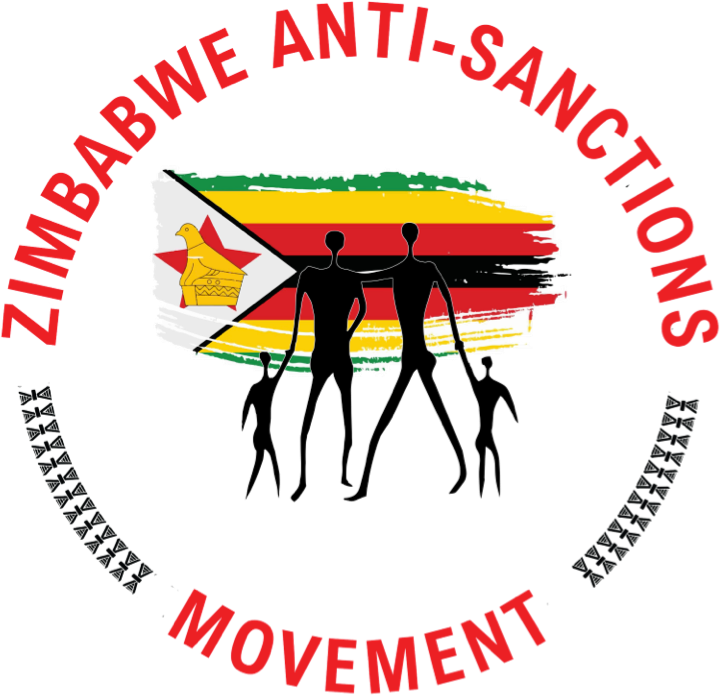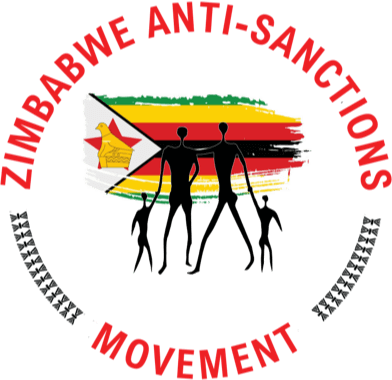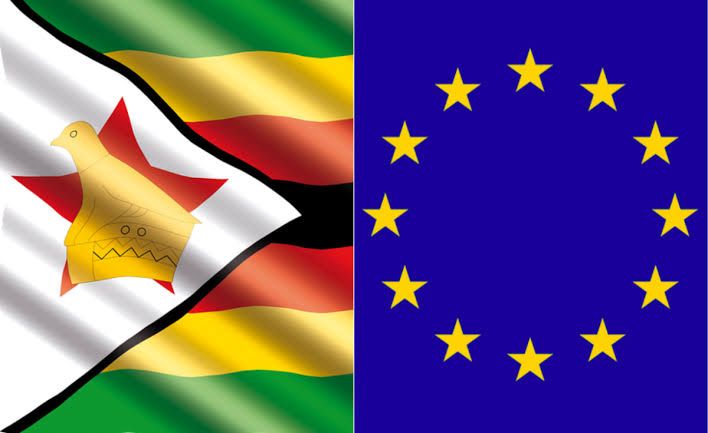For over 20yrs of US, EU and UK sanctions on Zimbabwe, Deutsche Bank has stuck it out as a corresponding bank to the Zimbabwean financial system, BUT, all of a sudden, something has spooked them to break their ties just when Zimbabwe’s economy is on a rapid recovery path: exports are up, manufacturing is growing, some of the biggest inland oil reserves in Africa have been discovered in the Zambezi basin, the continent’s biggest iron smelter is being built in Mvuma and the country is re-engaging with the west.
Notwithstanding, in this same year, three negative financial crimes reports were written by separate agencies claiming that the Zimbabwean economy is run by corrupt mafia cartels and political kleptocrats who are contaminating the Zimbabwean financial system with dirty money, that is allegedly being laundered into the global financial markets and funding violence (terrorism).
The reports were carefully crafted to criminalize and target [without due process] the Zimbabwe National Army, certain Zimbabwean industrialists and investors such as Tagwirei, who have kept the Zimbabwean economy afloat under sanctions by creatively circumventing these illegal economic coercive measures over the past twenty years.
In retaliation, these reports from the Maverick [which is sponsored by Anglo America], The Sentry [a US investigative agency represented by George Clooney and purports to investigate people who profit from war without ever investigating the US military industrial complex] and Africa Research Consulting [who investigate corruption in Africa], paint a bleak picture that links the Zimbabwean financial system to these sanctions busters who they alleged launder dirty money through their global networks (and in the lastest ARC report, it sought to connect these alleged activities to sponsoring terrorism) to sponsor violence or terrorism, without giving any real evidence.
It would seem that the G7 nations which created the FATF (Financial Action Task Force), the same nations who have sanctions on Zimbabwe, are now moving to use such reports to Iranify (criminalize, taint or contaminate) the Zimbabwean financial system as a sponsor of violence, by deduction terrorism; so that they can move the country up from the greylist to the blacklist that currently has only Iran and South Korea as thr only threats to global peace and global financial stability.
This is a clear strategy to coerce private financial institutions to isolate Zimbabwe without due process and shift the crippling of Zimbabwe from the current use of the illegal, extrajudicial, extraterritorial and unilateral sanctions, that are now being understood to be impacting civilian human rights.
So, considering the above facts, there doesn’t seem to be any other valid reason why an opportunistic and resilient financier like Deutsche Bank -who stuck with Zimbabwe through 20 years of sanctions and five years of Zimbabwe being on the FATF greylist- would all of a sudden cut ties with the country when it’s on a rapid economic recovery that will benefit the bank. Unless of course, FATF and Deutsche’s government (Germany) have made clear their intent to blacklist Zimbabwe for the reports that link it to not only dirty money and money laundering, but the sponsorship of violence (terrorism) that the ARC report tried so hard to establish.
In the event that Deutsche Bank has been informed of FATF’s intention to blacklist Zimbabwe’s financial system, then the banks actions make sense because banks are mandated to cut ties with blacklisted jurisdictions if they are to remain compliant with credit ratings rules; G7, SEC, LMA and other investment standards and financial insurance conditions; to avoid downgrading, investment blacklisting, insurance risk and lenders recalling their debt.
Ever since the 9th of September 2001 terror attacks in New York, and the 2008 banking crisis thereafter; the US treasury in cahoots with their G7 partner treasuries, have unilaterally redefined global financial rules by lifting risk on entities doing business in locales the US government and her G7 allies [FATF] categorize as being linked to corruption, dirty money, money laundering and worse still, violence or terrorism.
In fear of having transactions being blocked in New York, London, Hong Kong, EU and Tokyo (which are controlled by the Anglo Americans), international financial institutions play along and follow rules laid down by FATF to shun and isolate any entities, persons, locales and institutions that the G7 identify as being linked to dirty money, money laundering, terrorism or failure to comply with their unilateral rules.
In addition, after the 2008 banking collapse (western banking fraud that collapsed western financial markets), 6 years after the establishment of FATF and strict anti-terrorism laws; new laws were added to mandatorily blacklist, block and downgrade jurisdictions, investments and stakeholders who trade with locales that threaten global security and now financial stability as defined by the G7.
Financial institutions were and are forced to follow these rules to isolate jurisdictions that are blacklisted by the G7 power elite on consensus rather than proof or court judgments to confirm the culpability of targets. And if financial institutions don’t tow the line, they risk being blacklisted themselves, in line with the infamous “it’s the either you are with us or with them” George Bush strategy.
The selective application of these rules immediately comes into question when you consider that even though western financial institutions in 2008 (in particular US banks) broke the financial rules: money laundering and illicit money flows, posing a threat to global finance and stability with the worst financial corruption in history. We never saw FATF blacklist a single western financial institution for contaminating the entire global financial system with dirty money that lost the world over $40 billion and still counting.
This is besides the fact that anti-money laundering & anti-terrorism laws and FATF (the Financial Action Task Force) that was meant to investigate such crimes, had been in existence and in force since 911.
Instead, in the aftermath of the banking crisis, US finance regulators, including the treasury told the world that western financial institutions were too big to fail or punish for their crimes, so they would be rewarded by a US taxpayer bail out.
In contrast, the African financial system [including Zimbabwe’s financial system] allow unadaptive and irresponsible financial institutions to fail and never bail them out with taxpayers money. Furthermore, these markets maintained a high threshold of compliance to anti-money laundering & anti-terrorism laws and as a result, Africa remained uncontaminated by 2008 Libor, illustrating that Africa is not a threat to global finance.
Nonetheless, the tightening of the rules after 911, saw the Somalian, Libyan, Afghan, Iranian, Iraqi and Syrian banking systems being targeted and isolated by western financial institutions on mere allegations that they were funding terrorism.
More scrutiny was put on developing countries which were forced to invest in compliance systems, financial intelligence centers and software, yet they do not manufacture weapons sold to terrorists, they don’t have funds to sponsor terrorists, they do not clear funds that buy weapons used in terrorism and they were not responsible for 911 or the 2008 banking crisis.
With immediate effect, financial institutions across the developing world ran the risk of being blacklisted for not affording new software or training to comply with the imposed western processes, KYC (Know Your Client) procedures or servicing their own local industrialists who are deemed undesirable to [or competing with] G7/EU interests.
In essence, western financial centers are too big to fail and can practically money launder and accept payments from terrorists for US and EU weapons, to advance western interests and they will be exempt from being blacklisted. But non-western financial markets are subject to the whims of their former colonizers once they compete with western interests because ignorant financial decision makers in these developing countries, accepted the imposition of unfair, uncompetitive, extrajudicial, arbitrary neo-colonialist financial rules.
It would seem money laundering and anti-terrorism laws are now a tool to hamper the independence of third world financial systems and to hinder their industrialists from competing for resources with the west.
Meanwhile, the whole world knows that the biggest conduits of funding terrorism and wars, the centers of money laundering of illicit financial flows and organized crime proceeds remain London, New York, EU, Jersey, Saudi Arabia, Dubai, Switzerland (that laundered Nazi proceeds without repercussion) and former colonial tax havens aptly named British Virgin Islands, Mauritius, Caymen Islands etc.
So what is the big picture to all this?
As I mentioned in the video I made and shared earlier this week. I see the US, EU and UK being forced to ease their sanctions on Zimbabwe after the tacit admission by the US Congress Committee On The Impact Of Sanctions On Human Rights and Health, that their sanctions might be impacting on human rights and health in Africa.
However, I don’t see the west allowing Zimbabwe to develop unimpeded after winning the fight against sanctions, because that would send a message to other African countries that Zimbabwe has successfully defeated western hegemony after taking back their land and resources and they should follow suit. It’s highly unlikely the west would allow such a shift in the world order because it’s a risk to their welfare, which is anchored on using war and sanctions to exploit Africa.
This is why it’s more likely that the US, EU and UK are trying to evolve their sanctions by using G7 FATF money laundering and anti terrorism laws to blacklist the Zimbabwean financial system, to wholly isolate it from the global financial system of investment, banking, loans, money transfer systems, insurance and payment systems to halt economic development.
This will in turn shield the US, EU and UK from the threat of being dragged into international courts and exposed for engaging in illegal economic warfare (unilateral [single] nation sanctions) that collectively punishes civilians, thus violating international law, human rights and health in Zimbabwe.
In essence, the targeting of the Zimbabwean financial sector is yet another move by the west to advance its economic war on Zimbabwe without risking being held accountable for crimes against humanity, genocide or persecution.
The blacklisting of the Zimbabwean financial system is a noose that is slowly tightening around the financial system and it would seem that it has forced Deutsche Bank to break its relationship with Zimbabwe’s division of Standard Bank.
And if the Zimbabwean government, army, targeted investors and the private sector do not unite to proactively deal with this evolving financial war, the isolation of the Zimbabwean banking system will choke the Zimbabwean economic recovery worse than the 20 years of illegal sanctions. It’s a guaranteed way for the west to stop Zimbabwe’s defiant rise against western hegemony.
As far as I am concerned, Zimbabwe and the investors who have been targeted, must take the US, EU and UK to the world court, regional and continental courts for their extrajudicial punishment by sanctions that are contravening human rights. This move should be used to solicit a ruling by a global court against this illegal economic war that deprives Zimbabweans of water, food, healthcare, social services and economic development; to expose the western agenda to cripple Zimbabwe’s economy to stop it from competing.
The ruling must then be used to sue for reparations, all entities (particularly financial institutions and entities) that have implemented these illegal sanctions, confiscating Zimbabwean payments or blocking payments. We can then also use this ruling in future to flag any attempts by the west to isolate Zimbabwe’s (or any other African country’s) financial system extrajudicially and rewrite financial laws to be fair and competitive in a world where the west are the worst terrorists and violators of money laundering and terrorism rules.
As a nation we need to learn to be united, proactive and not reactive. Our government needs to learn to be inclusive and to use its scenario planners in its proactive planning process instead of sidelining them.
By Rutendo Bereza Matinyarare.




